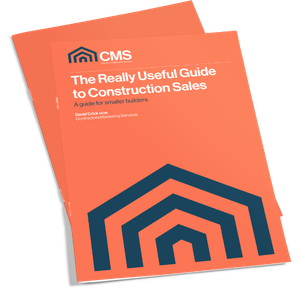When you get the opportunity to tender, you’ll be passing on the project to the estimating team and it might feel like your job is done. It’s not! The best construction sales professionals stick with it through the tender period and help to bring the contract over the line.
Think of your tender as a major sales document in its own right.
Even if there are other tender prices submitted, some tenderers may fail to follow-up. Genuine interest and a courteous follow-up will boost your chances of a win. To give a specific example, I remember one of my builder clients winning a £750,000 tender for a new-build high-end house in Surrey. This builder was third of three on the list and £50k above the lowest bid. What made the difference and won them the job? An excellent tender presentation - fully detailed with cost breakdowns, an evident interest in the job and a willingness to negotiate.
To increase your chances at the tender stage, here are ten key actions you need to take when your price goes in.
1. Find the decision makers – Who makes the definitive yes or no? Very often the client is strongly influenced by the architect. Or it could be a family member who is a QS. It’s frustrating to make your case only for someone to say “I’ll pass that on”. Asking about the decision maker early in the process will ensure you are talking to the right person!
2. Is your tender detailed and impressive?– Another of the builders I work with has developed the best tender format I’ve seen. It’s a 16-page document, sent in pdf and hard copy to both client and architect. This is always remarked on by the architect and/or client. A good tender goes a long way to securing future work opportunities. It includes:
- quality covers
- a thank you letter that affirms the builder’s keen interest and commitment to the job
- the tender offer, followed by two elemental cost breakdowns
- an appendix with potential cost savings, which really adds value for the client
- relevant case studies of recent, similar jobs that prove they can deliver
3. Look for potential cost savings – These cannot be part of the actual tender – but they can be in an appendix. If the job comes in over budget, or if you’re a close number two on the list, your consideration of savings may be crucial.
4. Submit on time or a day early! – You’d be surprised how many builders submit late without informing the architect. There’s no better way to damage a reputation. If you have no option – in case of illness, for example – then alert the architect without delay, and give a date when you can get the price in. You’ll always get respect for being open.
5. Be open if you can’t do it after all – If you learn halfway through the process that you can’t tender for the project this time, for whatever reason, tell the architect as soon as possible. You will earn brownie points for honesty. If you wait to inform the architect, you could put them in a difficult situation with their client. Tell them early, and they may have time to secure another builder to tender. Then they will appreciate your openness, and that will boost your chances next time.
6. Check receipt and say thank you – When you’ve submitted your price, call right away to check that your tender has been received, and say thank you for the opportunity. Gratitude goes a long way in construction and will predispose the architect towards you. It’s also a perfect opportunity to ask if it would be okay to ring back in a week to check in.
7. Call again a week later – as suggested above, call back. Most architects are comfortable with a follow-up call. Ask if all the prices are back and politely inquire about where you stand. You aren’t going to hear much detail, but they may indicate if your price is of interest. Confirm your willingness to look at cost reductions or negotiate – that may be enough to move you up the ladder if there’s no clear favourite.
8. Stay involved – If you’re committed at the start of the job, there’s a good likelihood you’ll be committed all the way through. Architects, clients and Quantity Surveyors appreciate builders who show genuine interest. If the client’s budget needs £15k off to make it work, how can you find that £15k for them? Or if they want to add something late in the day – can you re-price to allow for that?
9. Lose graciously – I’ll be honest: you’re going to lose more than you win. That’s absolutely normal, and I if you win one in four you’re doing fine. So make sure you use the bad news as an opportunity. When you hear that you weren’t successful, be gracious in defeat. Your time will come. Wish them well with the job, find out who did win it and then ask about the next job coming out to tender.
10. Picture the long game – See beyond the job in front of you. Concentrate on building a solid working relationship with the architect. You’re not just chasing jobs, you’re building a relationship with a work provider. Over the next few years, that could pay you returns worth millions of pounds.

